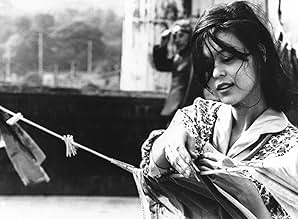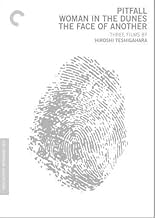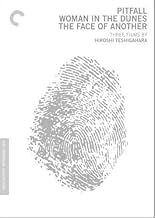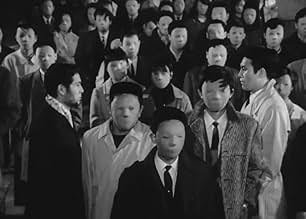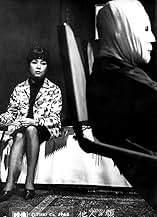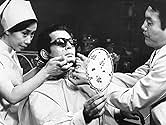A businessman with a disfigured face obtains a lifelike mask from his doctor, but the mask starts altering his personality.A businessman with a disfigured face obtains a lifelike mask from his doctor, but the mask starts altering his personality.A businessman with a disfigured face obtains a lifelike mask from his doctor, but the mask starts altering his personality.
- Awards
- 2 wins total
Robert Dunham
- Foreign man in Bar
- (uncredited)
Featured reviews
Mr. Okuyama is involved in an accident at work which melts off his face and this understandably is constantly nagging him. This makes a mark on the relationship with his wife as he talks out at her about how miserable he is and what a monster he has become. He then talks his psychiatrist into making him a new face (which was quite easily done since the psychiatrist has had these kind of thoughts before) and he then goes on 'vacation'.
This is so excellent in every way. It is not a sci-fi movie, but in feel it sometimes comes close to. The images are quite surreal at times, the music is out of this world and some of the sets are not to be found in real life.
The editing is masterfully done, switching between main story and a parallel story about a girl with a similar problem, as well as switching between hand-held camera (not too shaky though), still pictures and still standing camera. The pictures of Segawa Hiroshi fits 35mm nicely, sometimes manipulating the background like I haven't seen before for example when the psychiatrist and Mr. Okayama is talking at the club and the crowd behind get 'invisible' by lighting.
Kyou Machiko did a terrific job in Ozu's 'Ukigusa' and likewise here. Too bad we don't see that much of her. Nakudai Tatsuya plays well as the mask. I don't know exactly what was special effects and not, but it was hard to tell.
Author and writer of screenplay Abe Koubou, director Teshigahara Hiroshi and Takemitsu Touru was behind another favourite of mine; 'Suna no Onna'. They also made 'Moetsukita Chizu' and I cant wait to get my hands on it!!
This is so excellent in every way. It is not a sci-fi movie, but in feel it sometimes comes close to. The images are quite surreal at times, the music is out of this world and some of the sets are not to be found in real life.
The editing is masterfully done, switching between main story and a parallel story about a girl with a similar problem, as well as switching between hand-held camera (not too shaky though), still pictures and still standing camera. The pictures of Segawa Hiroshi fits 35mm nicely, sometimes manipulating the background like I haven't seen before for example when the psychiatrist and Mr. Okayama is talking at the club and the crowd behind get 'invisible' by lighting.
Kyou Machiko did a terrific job in Ozu's 'Ukigusa' and likewise here. Too bad we don't see that much of her. Nakudai Tatsuya plays well as the mask. I don't know exactly what was special effects and not, but it was hard to tell.
Author and writer of screenplay Abe Koubou, director Teshigahara Hiroshi and Takemitsu Touru was behind another favourite of mine; 'Suna no Onna'. They also made 'Moetsukita Chizu' and I cant wait to get my hands on it!!
Teshigahara has never shied away from examining the more unsettling dimensions of human experience. With the trilogy of full-length collaborations with Kobo Abe, Teshigahara encapsulated the Kafkaesque hellishness of quotidian life, the yawning, gaping chasm of emptiness that lies beneath the veneer of stability.
The ubiquitous influence of the French absurdists/existentialists, Kafka and Dostoevsky looms large here- one is reminded most often of Sartre's "No Exit", R.D. Laing's "Knots" and Dostoevsky's "Crime And Punishment". Sartre, Laing and Abe all underline how little autonomy we really have over constituting our own identities- often, we may find that we exist only as beings-for-others, entirely 'encrusted' within personas not of our own making, but assigned to us. For Okuyama and the unnamed scarred woman, they are imprisoned in their vulgar corporeality. Met with revulsion everywhere, they come to accept ugliness as an indelible mark of their being. Trapped within the oppressive confines of flesh, they cannot evade the pity and repugnance that their countenances arouse. It is little wonder that Okuyama becomes self-lacerating and embittered.
Throughout the film, the viewer confronts how precarious identity truly is- the assumption that selves are continuous and linear from day-to-day rests entirely on the visage. The doctor's paroxysm of inspiration in the beer hall affords a glimpse into the anarchic potential of his terrible invention, one that would rend civilization asunder. Indeed, the final epiphany is particularly unnerving- "some masks come off, some don't". We all erect facades, smokescreens of self that we maintain with great effort.
Beneath the epidermis, as Okuyama discovers, is vacuity and nihility. This is likely the explanation for Okuyama's gratuitous, Raskolnikov-esquire acts of crime at the conclusion of the film- faced with the frontierless void of freedom, he desires to be apprehended and branded by society. Integration into society, after all, requires a socially-assigned, unified role, constituted by drivers licenses, serial numbers and criminal records. Without such things, Okuyama is a non-entity.
Aesthetically, the film exhibits all the rigour and poetry of Teshigahara's other work. Cocteau, Ernst and Duchamp, in particular, are notable wellsprings for the film's visual grammar. Literate, expressionistic and profoundly disorienting, this might be my favorite Teshigahara work.
The ubiquitous influence of the French absurdists/existentialists, Kafka and Dostoevsky looms large here- one is reminded most often of Sartre's "No Exit", R.D. Laing's "Knots" and Dostoevsky's "Crime And Punishment". Sartre, Laing and Abe all underline how little autonomy we really have over constituting our own identities- often, we may find that we exist only as beings-for-others, entirely 'encrusted' within personas not of our own making, but assigned to us. For Okuyama and the unnamed scarred woman, they are imprisoned in their vulgar corporeality. Met with revulsion everywhere, they come to accept ugliness as an indelible mark of their being. Trapped within the oppressive confines of flesh, they cannot evade the pity and repugnance that their countenances arouse. It is little wonder that Okuyama becomes self-lacerating and embittered.
Throughout the film, the viewer confronts how precarious identity truly is- the assumption that selves are continuous and linear from day-to-day rests entirely on the visage. The doctor's paroxysm of inspiration in the beer hall affords a glimpse into the anarchic potential of his terrible invention, one that would rend civilization asunder. Indeed, the final epiphany is particularly unnerving- "some masks come off, some don't". We all erect facades, smokescreens of self that we maintain with great effort.
Beneath the epidermis, as Okuyama discovers, is vacuity and nihility. This is likely the explanation for Okuyama's gratuitous, Raskolnikov-esquire acts of crime at the conclusion of the film- faced with the frontierless void of freedom, he desires to be apprehended and branded by society. Integration into society, after all, requires a socially-assigned, unified role, constituted by drivers licenses, serial numbers and criminal records. Without such things, Okuyama is a non-entity.
Aesthetically, the film exhibits all the rigour and poetry of Teshigahara's other work. Cocteau, Ernst and Duchamp, in particular, are notable wellsprings for the film's visual grammar. Literate, expressionistic and profoundly disorienting, this might be my favorite Teshigahara work.
Mr. Okuyama (Tatsuya Nakadai) is a physically and emotionally wounded man. After an industrial accident at work, his face has been scarred and mutilated beyond recognition, and even his wife rejects him, even though she says his physical appearance doesn't matter. It has left him bitter and angry, until his psychiatrist Dr. Hira (Mikijiro Hira) comes up with a way to fashion a 'face mask' that will give him the appearance of having a completely normal face, albeit with a few joining marks. Hira doesn't do this just out of kindness, he is fascinated how this new face will alter Okuyama's personality and way of life.
The Face of Another is a fascinating film that highlights the social attitudes to physical appearance. There are hundreds of films and morality tales that teach you that it is inner beauty that counts, and once you allow this to shine then your physical attractiveness becomes irrelevant. Everyone knows that this is bullshit, so its refreshing to see a film that makes it clear from the outset that physical appearance has a massive part to play in society. Okuyama's new face, which is an attractive one, changes him so much that he takes on an almost dual identity. Dr. Hira delights in telling him that he has bought flashy new clothes, something he was never concerned with before. It becomes clear that whilst before Okuyama merely wanted to be normal again and fit back in society, his new face is engulfing him, and to be 'normal' simply isn't enough anymore.
As with many of the Japanese New Wave film-makers of the 1960's-70's, director Hiroshi Teshigahara takes some bold steps and sneaks in some surrealist and art-house values in a movie that is otherwise played relatively straight. A 'fictional' character appears every now and then throughout (she is first imagined by Okuyama's wife as a character in a movie); one side of her face is scarred and burned. She appears quite rarely, but seems to serve as an alternative to Okuyama's increasingly vain soul. Another scene seems a ball of hair that floats in the air, unnoticed by the people in the laboratory. I have no idea what it meant, and couldn't really admit to it being wholly successful, but it certainly got my attention nonetheless.
A powerful, disturbing, and poignant drama/horror from the greatest era in Japanese cinema. The film seems all the more important now, 45 years on, in a world where a botox injection can be as easy as buying a pack of cigarettes, and where physical 'beauty' is less a bonus than a necessity.
www.the-wrath-of-blog.blogspot.com
The Face of Another is a fascinating film that highlights the social attitudes to physical appearance. There are hundreds of films and morality tales that teach you that it is inner beauty that counts, and once you allow this to shine then your physical attractiveness becomes irrelevant. Everyone knows that this is bullshit, so its refreshing to see a film that makes it clear from the outset that physical appearance has a massive part to play in society. Okuyama's new face, which is an attractive one, changes him so much that he takes on an almost dual identity. Dr. Hira delights in telling him that he has bought flashy new clothes, something he was never concerned with before. It becomes clear that whilst before Okuyama merely wanted to be normal again and fit back in society, his new face is engulfing him, and to be 'normal' simply isn't enough anymore.
As with many of the Japanese New Wave film-makers of the 1960's-70's, director Hiroshi Teshigahara takes some bold steps and sneaks in some surrealist and art-house values in a movie that is otherwise played relatively straight. A 'fictional' character appears every now and then throughout (she is first imagined by Okuyama's wife as a character in a movie); one side of her face is scarred and burned. She appears quite rarely, but seems to serve as an alternative to Okuyama's increasingly vain soul. Another scene seems a ball of hair that floats in the air, unnoticed by the people in the laboratory. I have no idea what it meant, and couldn't really admit to it being wholly successful, but it certainly got my attention nonetheless.
A powerful, disturbing, and poignant drama/horror from the greatest era in Japanese cinema. The film seems all the more important now, 45 years on, in a world where a botox injection can be as easy as buying a pack of cigarettes, and where physical 'beauty' is less a bonus than a necessity.
www.the-wrath-of-blog.blogspot.com
I loved the premise, appreciated the philosophy, and enjoyed some of the avant-garde bits of filmmaking here, but I don't think this film quite lived up to its full potential, and it didn't fully connect with me.
From the start, there are existential themes of isolation and absurdity, and the man's condition reminded me of Gregor Samsa waking up and discovering he was a giant bug. With his face heavily bandaged, he's alienated from everyone around him, including his wife, who shrinks from his touch. The film explores identity, acceptance, and whether the mask or persona we adopt liberates or controls us. The minor parallel story of the young woman with the scar on her face also deals with a mask of sorts, and isolation.
Existentialism was common after WWII, and perhaps heightened in Japan by its having lost the war, and gone through more dramatic changes politically and psychologically. Maybe the young woman in the minor story, with burns apparently suffered in childhood at Nagasaki, is a symbol for the country's scars, and its identity fundamentally changing. Similarly, maybe the man losing his face from an accident at work is a symbol for the modern or corporate world changing us, as we work as cogs in a machine.
I loved to think about those things, but the film doesn't expand on them as profoundly as it could have. Instead of a character arc that shows some form of change in the man over time, it gives us mostly dialogue which doesn't land as philosophically as I think it was intended, and commits the sin of telling us instead of showing us in the process. The doctor gives us dire warnings about far more changes than we actually see. Having the man's primary focus be to seduce his wife while disguised in his new mask was unimaginative and uninspired, though I did like thinking about the irony of this being the opposite of love, which should involve an unmasking and getting to one another's 'true self.' There are also banal bits like women putting on make-up being yet another form of mask. As for the parallel story, with the incest, rising sun, and oblivion, I think there is symbolism and some level of desperation or despair here, but it's not strong, and narratively it probably should have been at least loosely integrated with the main story.
Overall though, the film is well worth seeing. The production value is high, with that ultra-cool doctor's office, and the assortment of creative visual tricks director Hiroshi Teshigahara gives us, including freeze frames and surreal imagery. The striking scene in the crowd towards the end is also fantastic, and the film's best. My favorite line to ponder was this one: "I wonder if we see the true face of a gem when it's polished, or in the rough."
From the start, there are existential themes of isolation and absurdity, and the man's condition reminded me of Gregor Samsa waking up and discovering he was a giant bug. With his face heavily bandaged, he's alienated from everyone around him, including his wife, who shrinks from his touch. The film explores identity, acceptance, and whether the mask or persona we adopt liberates or controls us. The minor parallel story of the young woman with the scar on her face also deals with a mask of sorts, and isolation.
Existentialism was common after WWII, and perhaps heightened in Japan by its having lost the war, and gone through more dramatic changes politically and psychologically. Maybe the young woman in the minor story, with burns apparently suffered in childhood at Nagasaki, is a symbol for the country's scars, and its identity fundamentally changing. Similarly, maybe the man losing his face from an accident at work is a symbol for the modern or corporate world changing us, as we work as cogs in a machine.
I loved to think about those things, but the film doesn't expand on them as profoundly as it could have. Instead of a character arc that shows some form of change in the man over time, it gives us mostly dialogue which doesn't land as philosophically as I think it was intended, and commits the sin of telling us instead of showing us in the process. The doctor gives us dire warnings about far more changes than we actually see. Having the man's primary focus be to seduce his wife while disguised in his new mask was unimaginative and uninspired, though I did like thinking about the irony of this being the opposite of love, which should involve an unmasking and getting to one another's 'true self.' There are also banal bits like women putting on make-up being yet another form of mask. As for the parallel story, with the incest, rising sun, and oblivion, I think there is symbolism and some level of desperation or despair here, but it's not strong, and narratively it probably should have been at least loosely integrated with the main story.
Overall though, the film is well worth seeing. The production value is high, with that ultra-cool doctor's office, and the assortment of creative visual tricks director Hiroshi Teshigahara gives us, including freeze frames and surreal imagery. The striking scene in the crowd towards the end is also fantastic, and the film's best. My favorite line to ponder was this one: "I wonder if we see the true face of a gem when it's polished, or in the rough."
James Quandt's strident narration of the "video essay" that accompanies the Criterion release of THE FACE OF ANOTHER complains about the reception the film received in the United States on its initial release. He quotes the critics of the time: "extravagantly chic," "arch," "abstruse," "hermetic," "slavishly symbolic," and "more grotesque than emotionally compelling." Stop right there! These critics knew what they were talking about.
The film combines several hoary and not particularly profound narrative contrivances. Here's a man attempting to seduce his wife, pretending to be another person--this was old when THE GUARDSMAN first went on stage and has been done countless times. Then there's the classic mad scientist, presented with very little nuance, delving into Things that Man Was Not Meant to Know. Related to this is that the story is only able to exist by grossly underestimating man's ability to adapt to the unknown. (An example is the 1952 science fiction story "Mother" by Alfred Coppel in which astronauts all return insane when confronted with the vastness of space.) These primitive tropes are shamelessly built on a simple narrative situation that is completely unable to carry them: a man with a disfigured face getting facial reconstruction. This happens all the time, so what's to "not meant to know"? If all this isn't enough, Teshigahara tacks on an unrelated, completely separate set of characters in their own undeveloped narrative that even Quandt thinks doesn't work. The dialogue by author/screenwriter Kobo Abe is risible, sounding like something out of a grade-B forties horror film.
To disguise the paucity of the film's narrative, Teshigahara has tricked it up with what Quandt admiringly calls "its arsenal of visual innovation: freeze-frames, defamiliarizing close-ups, wild zooms, wash-away wipes, X-rayed imagery, stuttered editing, surrealist tropes, swish pans, jump cuts, rear projection, montaged stills, edge framing, and canted, fragmented, and otherwise stylized compositions." These arty-farty gimmicks (and more) are, of course, hardly "innovations." They were endemic in the early sixties. Their extensive use seems a vain attempt to disguise the film's shallow content. Quandt also sees great significance in the many repetitions in the film: I see only repetition.
But even that is not the film's worst problem. Teshigahara often seems like a still photographer lost in a form that requires narrative structure. His inability to develop a sustained narrative makes the film seem far longer than its already-long two hours plus. Things happen, but the film doesn't really progress. The end result is little more than a compendium of tricks and narrative scraps borrowed from others.
The film combines several hoary and not particularly profound narrative contrivances. Here's a man attempting to seduce his wife, pretending to be another person--this was old when THE GUARDSMAN first went on stage and has been done countless times. Then there's the classic mad scientist, presented with very little nuance, delving into Things that Man Was Not Meant to Know. Related to this is that the story is only able to exist by grossly underestimating man's ability to adapt to the unknown. (An example is the 1952 science fiction story "Mother" by Alfred Coppel in which astronauts all return insane when confronted with the vastness of space.) These primitive tropes are shamelessly built on a simple narrative situation that is completely unable to carry them: a man with a disfigured face getting facial reconstruction. This happens all the time, so what's to "not meant to know"? If all this isn't enough, Teshigahara tacks on an unrelated, completely separate set of characters in their own undeveloped narrative that even Quandt thinks doesn't work. The dialogue by author/screenwriter Kobo Abe is risible, sounding like something out of a grade-B forties horror film.
To disguise the paucity of the film's narrative, Teshigahara has tricked it up with what Quandt admiringly calls "its arsenal of visual innovation: freeze-frames, defamiliarizing close-ups, wild zooms, wash-away wipes, X-rayed imagery, stuttered editing, surrealist tropes, swish pans, jump cuts, rear projection, montaged stills, edge framing, and canted, fragmented, and otherwise stylized compositions." These arty-farty gimmicks (and more) are, of course, hardly "innovations." They were endemic in the early sixties. Their extensive use seems a vain attempt to disguise the film's shallow content. Quandt also sees great significance in the many repetitions in the film: I see only repetition.
But even that is not the film's worst problem. Teshigahara often seems like a still photographer lost in a form that requires narrative structure. His inability to develop a sustained narrative makes the film seem far longer than its already-long two hours plus. Things happen, but the film doesn't really progress. The end result is little more than a compendium of tricks and narrative scraps borrowed from others.
Did you know
- TriviaDirector Hiroshi Teshigahara said that he intended the film to explore both personal and cultural identities. While the examination of personal identity is quite overt, Teshigahara also explored how Japan's cultural identity had been impacted by World War II and its aftermath.
- Quotes
Psychiatrist: You're not the only lonely man. Being free always involves being lonely. Just there is a mask you can peel off and another you can not.
- ConnectionsReferenced in Funeral Parade of Roses (1969)
- How long is The Face of Another?Powered by Alexa
Details
Box office
- Gross worldwide
- $35,185
- Runtime
- 2h 4m(124 min)
- Color
- Sound mix
- Aspect ratio
- 1.33 : 1
Contribute to this page
Suggest an edit or add missing content



